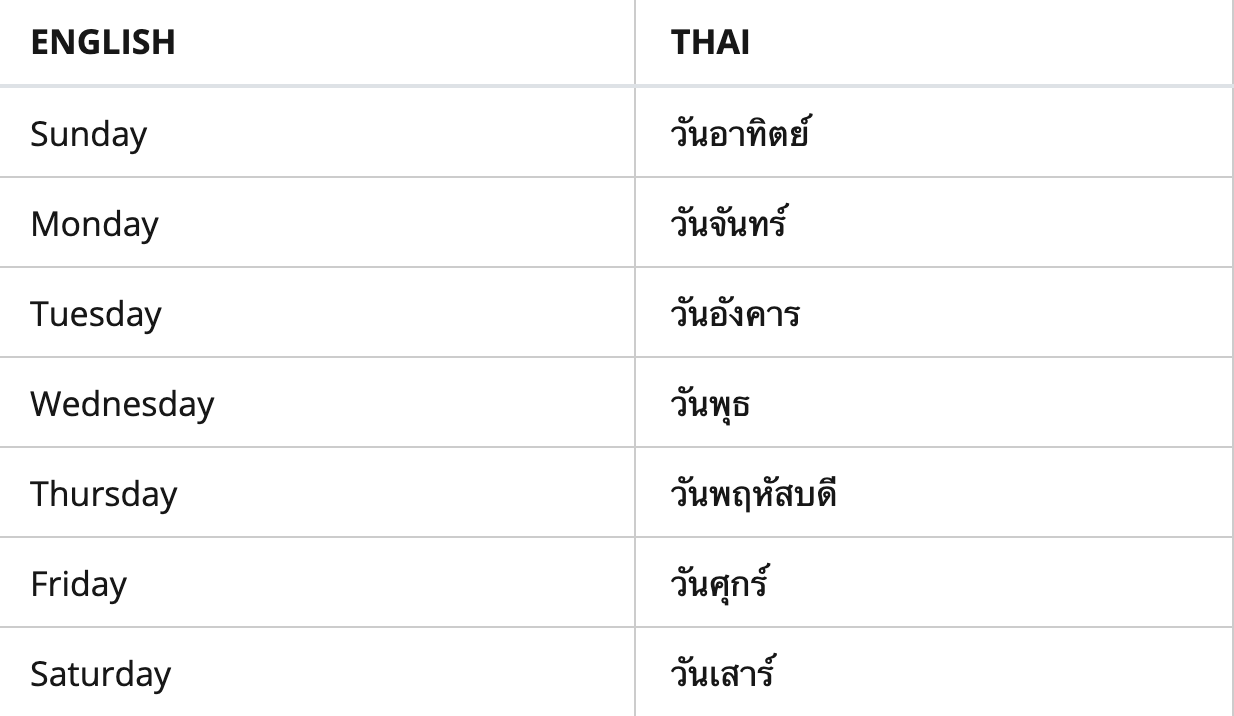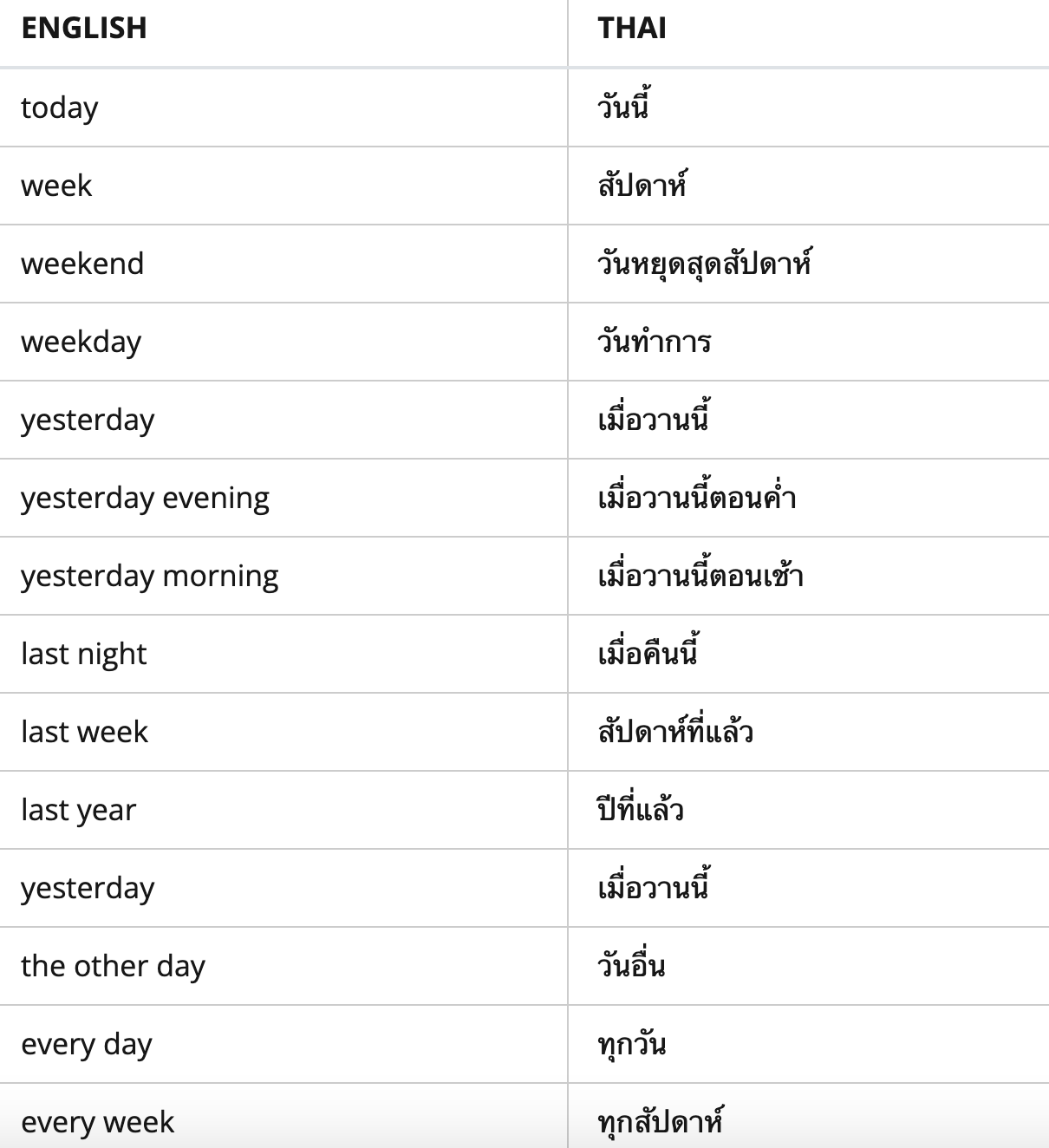Days, Months and Dates

มาเริ่มดูกันที่การบอกวันในหนึ่งสัปดาห์กันดีกว่าค่ะ
วันในหนึ่งสัปดาห์
ด้านล่างนี้คือคำศัพท์เจ็ดวันในหนึ่งสัปดาห์พร้อมวิธีการออกเสียง
⦿ วันจันทร์ Monday – /’mun.dei/
⦿ วันอังคาร Tuesday – /’tiu:z.dei/
⦿ วันพุธ Wednesday – /’wenz.dei/
⦿ วันพฤหัสบดี Thursday – /’thurz.dei/
⦿ วันศุกร์ Friday – /’frai.dei/
⦿ วันเสาร์ Saturday – /’sa.ta.dei/
⦿ วันอาทิตย์ Sunday – /’sun.dei/
วิธีการออกเสียง ให้ลงเสียงหนักที่พยางค์แรกเสมอ สองวันที่ออกเสียงยากที่สุดคือวันอังคารและวันพฤหัสบดี เพราะฉะนั้นอย่าลืมให้เวลาฝึกมากเป็นพิเศษนะคะ

อย่างที่เห็นนะคะ เราจะเขียนพยัญชนะตัวแรกเป็นตัวพิมพ์ใหญ่เสมอ ลองไปดูตัวอย่างกันค่ะ
– I work from Monday to Friday. I’m free on Saturday and Sunday.
– Our next lesson is on Wednesday.
– Saturday is his favorite day of the week because he plays football.
– The meeting is on Thursday at 10:30.
– We’ve got an appointment on Tuesday morning.
เห็นแล้วใช่ไหมคะ เราจะใช้ ‘on’ หน้าคำศัพท์บอกวันในสัปดาห์
เดือน
เดือนทั้งสิบสองพร้อมวิธีการออกเสียงมีดังต่อไปนี้ค่ะ
⦿ มกราคมJanuary – /’gian.iu.e.ri/
⦿ กุมภาพันธ์ February – /’fe.bru.e.ri/
⦿ มีนาคม March – /’ma:tc/
⦿ เมษายน April – /’ei.pril/
⦿ พฤษภาคม May – /’mei/
⦿ มิถุนายนJune – /’giun/
⦿ กรกฎาคม July – /giu’lai/
⦿ สิงหาคม August – /’o:.gust/
⦿ กันยายน September – /sep’tem.ba/
⦿ ตุลาคม October – /ok’tou.ba/
⦿ พฤศจิกายน November – /nou’vem.ba/
⦿ ธันวาคม December – /di’sem.ba/
สำหรับเดือน พยัญชนะตัวแรกเป็นตัวพิมพ์ใหญ่เสมอด้วยเช่นกัน มาดูตัวอย่างการใช้กันค่ะ
– February is the shortest month of the year, with only 28 days.
– They’re going away on holiday in May.
– The weather is very hot here in July.
– It’s very cold in December.
– Halloween is in October.
อย่างที่เห็นนะคะ ถ้าเป็นเดือนเราจะใช้ ‘in’ ค่ะ
วันที่
เวลาที่เราพูดถึงวันที่ในภาษาอังกฤษ เรามักจะใช้เลขบอกลำดับที่ (fist, second, third เป็นต้น) แทนที่จะใช้เป็นเลขบอกจำนวนนับ (one, two, three เป็นต้น) มาทำความรู้จักเลขบอกลำดับที่กันค่ะ
- 1st – first
- 2nd – second
- 3rd – third
- 4th – fourth
- 5th – fifth
- 6th – sixth
- 7th – seventh
- 8th – eighth
- 9th – ninth
- 10th – tenth
ตั้งแต่ลำดับที่ 11-19 จะใส่ -th ลงไปที่ท้ายตัวเลขเหมือนกันทั้งหมด
- 11th – eleventh
- 12th – twelfth (the letter v changes to f)
- 13th – thirteenth
- 14th – fourteenth
- 15th – fifteenth
- 16th – sixteenth
- 17th – seventeenth
- 18th – eighteenth
- 19th – nineteenth
ตัวเลขที่ลงท้ายด้วย -ty เช่น 20 และ 30 ให้เปลี่ยนจาก -y เป็น – i และเติม -eth ลงไป เช่น
- 20 – twentieth
- 30 – thirtieth
- 21st – twenty-first
- 22nd – twenty-second
- 23rd – twenty-third
- 24th – twenty-fourth
- 25th – twenty-fifth
- 26th – twenty-sixth
- 27th – twenty-seventh
- 28th – twenty-eighth
- 29th – twenty-ninth
- 30th – thirtieth
- 31st – thirty-first
สำหรับภาษาอังกฤษแบบบริติช การบอกวันที่จะเริ่มด้วยวันที่แล้วตามด้วยเดือน ในขณะที่อังกฤษแบอเมริกันมันจะเอาเดือนขึ้นก่อน กฎนี้ใช้เมื่อเวลาเราย่อวันที่ให้เหลือตัวเลขด้วย เช่น วันที่ 1st December 2017 ย่อเห็น
- 1/12/2017 สำหรับอังกฤษแบบบริติช
- 12/1/2017 สำหรับอังกฤษแบบอเมรกัน
เช่นเดียวกันวันในสัปดาห์ เราใช้ ‘on’ นำหน้าวันที่เช่นกัน ลองมาดูตัวอย่างกันค่ะ
– Paolo’s birthday is on June 3rd. (pronounced ‘on June the third’)
– New Year’s Day is on 1st January. (pronounced ‘on the first of January’)
– We’re flying back home on Tuesday, April 10th. (pronounced ‘on Tuesday, April the tenth’)
– They’re having a party on 16th November. (pronounced on the sixteenth of November.)
– Our Wedding Anniversary is on August 11th. (pronounced ‘on August the eleventh’.)
ปี
ในภาษาอังกฤษ วิธีอ่านปีค.ศ. จะแบ่งวิธีการนับเลขเป็นสองหลัก ตัวอย่าง
- 1750 – seventeen fifty
- 1826 – eighteen twenty-six
- 1984 – nineteen eighty-four
- 2017 – twenty seventeen
ตัวเลขบอกปีค.ศ.ที่เป็นปีถ้วน ให้อ่านดังต่อไปนี้
- 1400 – fourteen hundred
- 1700 – seventeen hundred
- 2000 – two thousand
ช่วงเก้าปีแรกของศตวรรษให้อ่านดังต่อไปนี้
- 1401 – fourteen oh one
- 1701 – seventeen oh one
- 2001 – two thousand and one
เราสามารถพูดถึงทศวรรษ (ช่วงระยะเวลาสิบปี) ดังต่อไปนี้
- 1960-1969 – The ‘60s – ออกเสียงว่า ‘the sixties’
- 1980-1989 – The ‘80s – ออกเสียงว่า ‘the eighties’.
- 2000 – 2009 – The 2000s – ออกเสียงว่า ‘the two thousands’
ยกตัวอย่างเช่น
– The Beatles were famous in the sixties.
– My parents got married in the seventies.
– Maradona played for Napoli in the eighties.
– Where were you living in the nineties?
– The internet became popular worldwide in the two thousands.
อย่างที่เห็นนะคะ เราใช้ ‘in’ หน้าปีค่ะ
สรุปการใช้บุพบทบอกวัน เวลา

ตัวอย่างประโยค:
– In my country, the schools start the academic year in September.
– Is he starting the new job on Monday?
– The company was founded in 1991.
– The Wedding is on July 25th.
– There was an economic boom in the 50’s.
หมายเหตุ: เวลาที่เราพูดถึงเทศกาลบางอย่าง เช่น “คริสมาสต์” หรือ “อีสเตอร์” เราจะใช้ “at” เช่น
Where will you be at Christmas? We’ll be in the mountains.
Most people visit their families at Easter.
อีกวิธีหนึ่งที่จะช่วยให้คุณจำการวันและเดือนในภาษาอังกฤษได้ดีขึ้น นั่นคือเปลี่ยนการตั้งค่าภาษาที่ใช้ในมือถือหรือคอมพิวเตอร์ให้เป็นภาษาอังกฤษ วิธีนี้คุณจะได้เห็นปฏิทินและนัดหมายงาน ๆ ต่างที่ฝึกได้ และถ้าคุณมีปฏิทินแขวนผนังหรือตั้งโต๊ะที่ทำงานหรือที่บ้าน ครั้งหน้าให้ลองหาแบบภาษาอังกฤษมาใช้ เป็นวิธีที่ง่ายแต่ได้ผลนักเชียว
- ASK AND ANSWER QUESTIONS
How many days are there in a week? ในหนึ่งสัปดาห์มีกี่วัน
- There are seven days in a week. มีเจ็ดวันในหนึ่งสัปดาห์
What day is today? วันนี้วันอะไร
- Today is Thursday. วันนี้วันพฤหัสบดี
What day was yesterday? เมื่อวานนี้วันอะไร
- Yesterday was Wednesday. เมื่อวานนี้วันพุธ
What day is tomorrow? พรุ่งนี้วันอะไร
- Tomorrow is Friday. พรุ่งนี้วันพฤหัสบดี
What do you do on Sundays? คุณทำอะไรในวันอาทิตย์
- I spend time with my family. ฉันใช้เวลากับครอบครัวของฉัน
- I go to the shopping mall with my family. ฉันไปห้างสรรพสินค้ากับครอบครัวของฉัน
- I play football with my friends. ฉันเล่นฟุตบอลกับเพื่อนของฉัน
How many days a week do you go to school? คุณไปโรงเรียนกี่วันในหนึ่งสัปดาห์
- I go to school five days a week. ฉันไปโรงเรียนห้าวันในหนึ่งสัปดาห์
When do you learn science? คุณเรียนวิชาวิทยาศาสตร์
I learn science on Mondays and Wednesdays. ฉันเรียนวิชาวิทยาศาสตร์ทุกวันจันทร์และวันพุธ
What day of the week were you born? คุณเกิดวันไหน
- I was born on a Wednesday. ฉันเกิดวันพุธ









